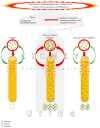New Pathogenic Concepts and Therapeutic Approaches to Oxidative Stress in Chronic Kidney Disease
- PMID: 27429711
- PMCID: PMC4939360
- DOI: 10.1155/2016/6043601
New Pathogenic Concepts and Therapeutic Approaches to Oxidative Stress in Chronic Kidney Disease
Abstract
In chronic kidney disease inflammatory processes and stimulation of immune cells result in overproduction of free radicals. In combination with a reduced antioxidant capacity this causes oxidative stress. This review focuses on current pathogenic concepts of oxidative stress for the decline of kidney function and development of cardiovascular complications. We discuss the impact of mitochondrial alterations and dysfunction, a pathogenic role for hyperuricemia, and disturbances of vitamin D metabolism and signal transduction. Recent antioxidant therapy options including the use of vitamin D and pharmacologic therapies for hyperuricemia are discussed. Finally, we review some new therapy options in diabetic nephropathy including antidiabetic agents (noninsulin dependent), plant antioxidants, and food components as alternative antioxidant therapies.
Figures



Similar articles
-
The hallmarks of mitochondrial dysfunction in chronic kidney disease.Kidney Int. 2017 Nov;92(5):1051-1057. doi: 10.1016/j.kint.2017.05.034. Kidney Int. 2017. PMID: 28893420 Free PMC article. Review.
-
Inflammatory cytokines in diabetic nephropathy.J Diabetes Res. 2015;2015:948417. doi: 10.1155/2015/948417. Epub 2015 Feb 15. J Diabetes Res. 2015. PMID: 25785280 Free PMC article. Review.
-
Targeting Mitochondria and Reactive Oxygen Species-Driven Pathogenesis in Diabetic Nephropathy.Rev Diabet Stud. 2015 Spring-Summer;12(1-2):134-56. doi: 10.1900/RDS.2015.12.134. Epub 2015 Aug 10. Rev Diabet Stud. 2015. PMID: 26676666 Free PMC article. Review.
-
Mitochondrial Dysfunction and Diabetic Nephropathy: Nontraditional Therapeutic Opportunities.J Diabetes Res. 2021 Dec 9;2021:1010268. doi: 10.1155/2021/1010268. eCollection 2021. J Diabetes Res. 2021. PMID: 34926696 Free PMC article. Review.
-
Renal oxidative stress induced by long-term hyperuricemia alters mitochondrial function and maintains systemic hypertension.Oxid Med Cell Longev. 2015;2015:535686. doi: 10.1155/2015/535686. Epub 2015 Mar 31. Oxid Med Cell Longev. 2015. PMID: 25918583 Free PMC article.
Cited by
-
Mitochondrial Targeting of Herbal Medicine in Chronic Kidney Disease.Front Pharmacol. 2021 May 26;12:632388. doi: 10.3389/fphar.2021.632388. eCollection 2021. Front Pharmacol. 2021. PMID: 34122064 Free PMC article. Review.
-
Temporal Alterations in Mitochondrial β-Oxidation and Oxidative Stress Aggravate Chronic Kidney Disease Development in 5/6 Nephrectomy Induced Renal Damage.Int J Mol Sci. 2020 Sep 6;21(18):6512. doi: 10.3390/ijms21186512. Int J Mol Sci. 2020. PMID: 32899919 Free PMC article.
-
Serum heat shock protein 27 levels predict cardiac mortality in hemodialysis patients.BMC Nephrol. 2018 Dec 17;19(1):359. doi: 10.1186/s12882-018-1157-1. BMC Nephrol. 2018. PMID: 30558560 Free PMC article.
-
Critical Shear Stress is Associated with Diabetic Kidney Disease in Patients with Type 2 Diabetes.Sci Rep. 2018 Jan 17;8(1):908. doi: 10.1038/s41598-018-19274-5. Sci Rep. 2018. PMID: 29343776 Free PMC article.
-
Enhanced oral bioavailability of EGCG using pH-sensitive polymeric nanoparticles: characterization and in vivo investigation on nephrotic syndrome rats.Drug Des Devel Ther. 2018 Aug 14;12:2509-2518. doi: 10.2147/DDDT.S172919. eCollection 2018. Drug Des Devel Ther. 2018. PMID: 30147298 Free PMC article.
References
-
- Tucker P. S., Scanlan A. T., Dalbo V. J. Chronic kidney disease influences multiple systems: describing the relationship between oxidative stress, inflammation, kidney damage, and concomitant disease. Oxidative Medicine and Cellular Longevity. 2015;2015:8. doi: 10.1155/2015/806358.806358 - DOI - PMC - PubMed
Publication types
MeSH terms
Substances
LinkOut - more resources
Full Text Sources
Other Literature Sources
Medical

